Business Law Report: English Legal System, New Business Laws
VerifiedAdded on 2020/11/23
|11
|3684
|466
Report
AI Summary
This report delves into the realm of business law, focusing on the English legal system and its implications for new businesses. It explores the structure of the UK's legal system, distinguishing between English, Scots, and Northern Ireland law, and outlines the roles of the Crown and Parliament in lawmaking. The report identifies both primary and secondary sources of UK law, including case law, legislation, legal encyclopaedias, and parliamentary publications. It also examines the key legislation that new businesses in the UK must adhere to, such as employment law (Employment Act 1996, Equality Act 2010), consumer rights (Sale of Goods Act 1979, Distance selling regulations), and competition law (Competition Act 1998, Enterprise Act 2002). Furthermore, it covers data protection (Data Protection Act 2018), contract law, and intellectual property law. The report includes a case study comparing the legal structures of a partnership firm and a company limited by shares, analyzing their implications for liability, taxation, and management, and it also looks at the outcome of law on business. This comprehensive analysis is designed to provide a solid understanding of the legal landscape for businesses operating in the UK.
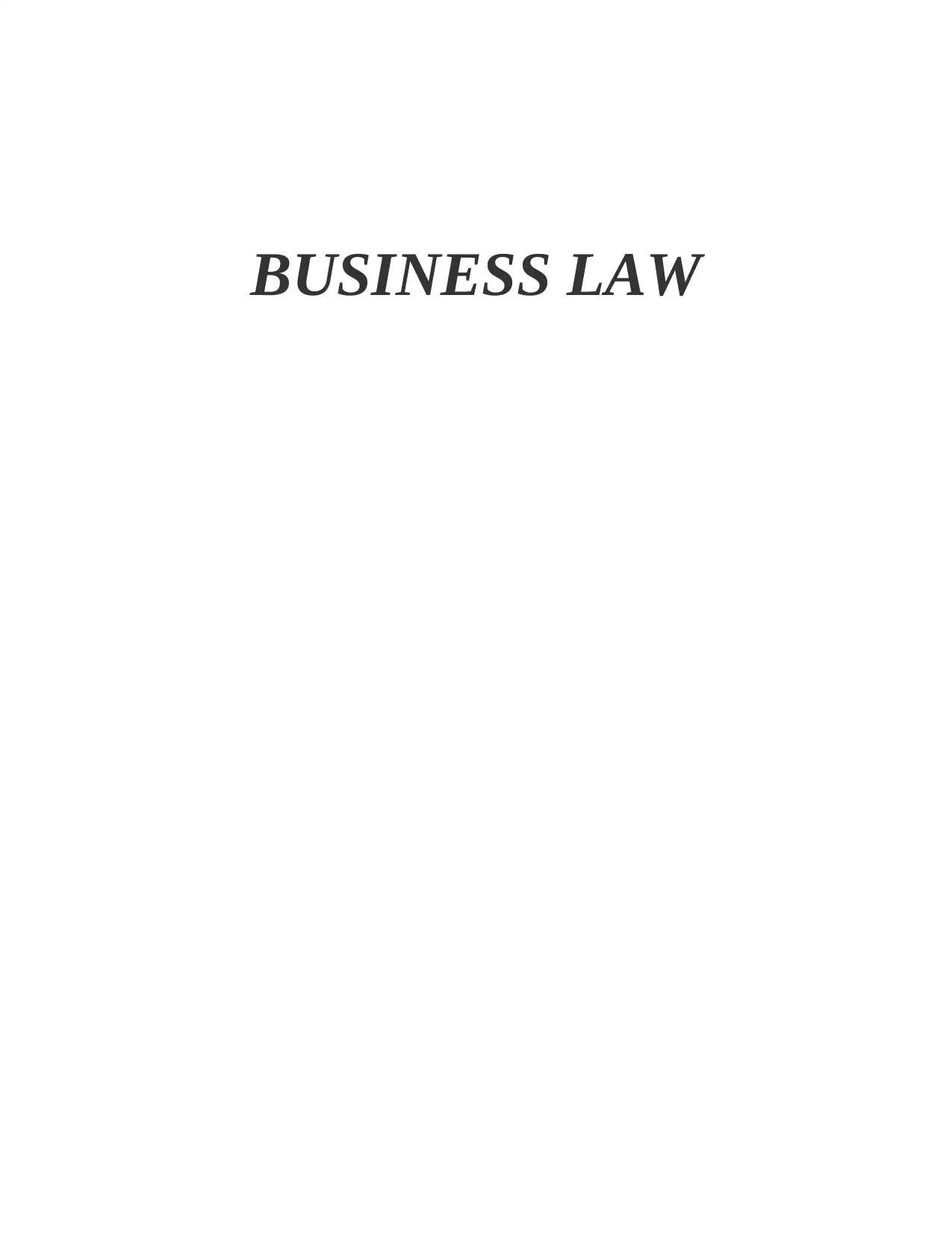
BUSINESS LAW
Paraphrase This Document
Need a fresh take? Get an instant paraphrase of this document with our AI Paraphraser
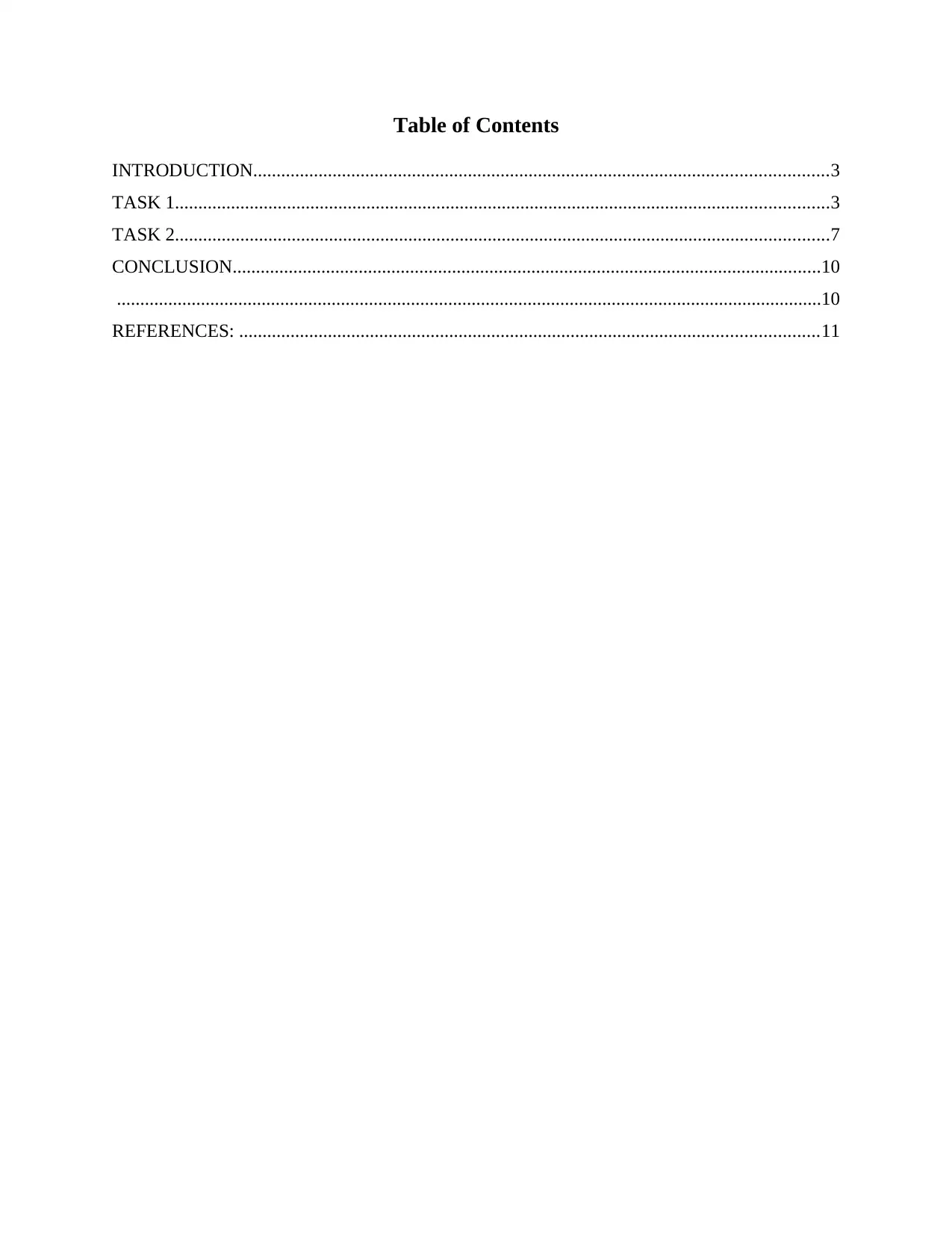
Table of Contents
INTRODUCTION...........................................................................................................................3
TASK 1............................................................................................................................................3
TASK 2............................................................................................................................................7
CONCLUSION..............................................................................................................................10
.......................................................................................................................................................10
REFERENCES: ............................................................................................................................11
INTRODUCTION...........................................................................................................................3
TASK 1............................................................................................................................................3
TASK 2............................................................................................................................................7
CONCLUSION..............................................................................................................................10
.......................................................................................................................................................10
REFERENCES: ............................................................................................................................11
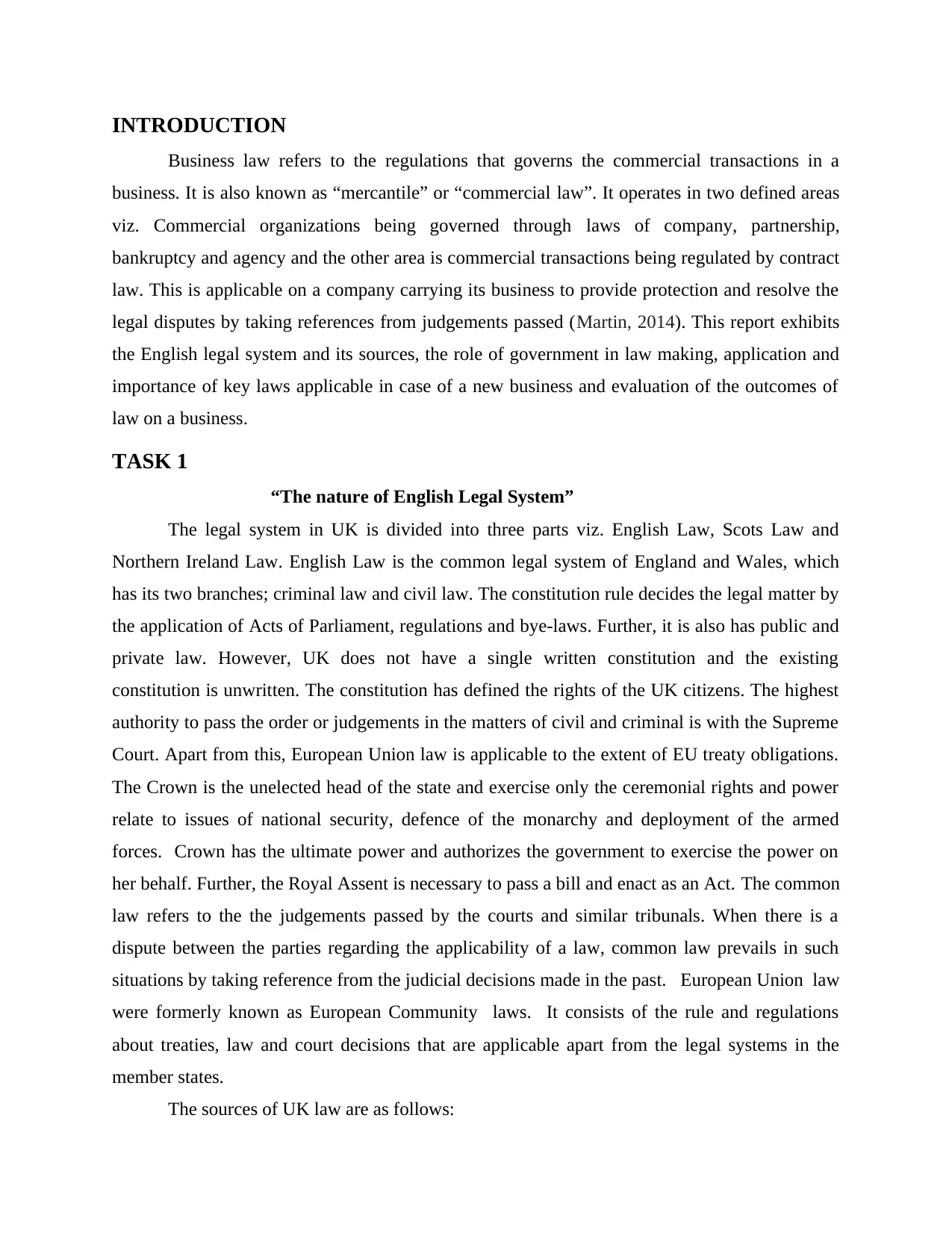
INTRODUCTION
Business law refers to the regulations that governs the commercial transactions in a
business. It is also known as “mercantile” or “commercial law”. It operates in two defined areas
viz. Commercial organizations being governed through laws of company, partnership,
bankruptcy and agency and the other area is commercial transactions being regulated by contract
law. This is applicable on a company carrying its business to provide protection and resolve the
legal disputes by taking references from judgements passed (Martin, 2014). This report exhibits
the English legal system and its sources, the role of government in law making, application and
importance of key laws applicable in case of a new business and evaluation of the outcomes of
law on a business.
TASK 1
“The nature of English Legal System”
The legal system in UK is divided into three parts viz. English Law, Scots Law and
Northern Ireland Law. English Law is the common legal system of England and Wales, which
has its two branches; criminal law and civil law. The constitution rule decides the legal matter by
the application of Acts of Parliament, regulations and bye-laws. Further, it is also has public and
private law. However, UK does not have a single written constitution and the existing
constitution is unwritten. The constitution has defined the rights of the UK citizens. The highest
authority to pass the order or judgements in the matters of civil and criminal is with the Supreme
Court. Apart from this, European Union law is applicable to the extent of EU treaty obligations.
The Crown is the unelected head of the state and exercise only the ceremonial rights and power
relate to issues of national security, defence of the monarchy and deployment of the armed
forces. Crown has the ultimate power and authorizes the government to exercise the power on
her behalf. Further, the Royal Assent is necessary to pass a bill and enact as an Act. The common
law refers to the the judgements passed by the courts and similar tribunals. When there is a
dispute between the parties regarding the applicability of a law, common law prevails in such
situations by taking reference from the judicial decisions made in the past. European Union law
were formerly known as European Community laws. It consists of the rule and regulations
about treaties, law and court decisions that are applicable apart from the legal systems in the
member states.
The sources of UK law are as follows:
Business law refers to the regulations that governs the commercial transactions in a
business. It is also known as “mercantile” or “commercial law”. It operates in two defined areas
viz. Commercial organizations being governed through laws of company, partnership,
bankruptcy and agency and the other area is commercial transactions being regulated by contract
law. This is applicable on a company carrying its business to provide protection and resolve the
legal disputes by taking references from judgements passed (Martin, 2014). This report exhibits
the English legal system and its sources, the role of government in law making, application and
importance of key laws applicable in case of a new business and evaluation of the outcomes of
law on a business.
TASK 1
“The nature of English Legal System”
The legal system in UK is divided into three parts viz. English Law, Scots Law and
Northern Ireland Law. English Law is the common legal system of England and Wales, which
has its two branches; criminal law and civil law. The constitution rule decides the legal matter by
the application of Acts of Parliament, regulations and bye-laws. Further, it is also has public and
private law. However, UK does not have a single written constitution and the existing
constitution is unwritten. The constitution has defined the rights of the UK citizens. The highest
authority to pass the order or judgements in the matters of civil and criminal is with the Supreme
Court. Apart from this, European Union law is applicable to the extent of EU treaty obligations.
The Crown is the unelected head of the state and exercise only the ceremonial rights and power
relate to issues of national security, defence of the monarchy and deployment of the armed
forces. Crown has the ultimate power and authorizes the government to exercise the power on
her behalf. Further, the Royal Assent is necessary to pass a bill and enact as an Act. The common
law refers to the the judgements passed by the courts and similar tribunals. When there is a
dispute between the parties regarding the applicability of a law, common law prevails in such
situations by taking reference from the judicial decisions made in the past. European Union law
were formerly known as European Community laws. It consists of the rule and regulations
about treaties, law and court decisions that are applicable apart from the legal systems in the
member states.
The sources of UK law are as follows:
⊘ This is a preview!⊘
Do you want full access?
Subscribe today to unlock all pages.

Trusted by 1+ million students worldwide
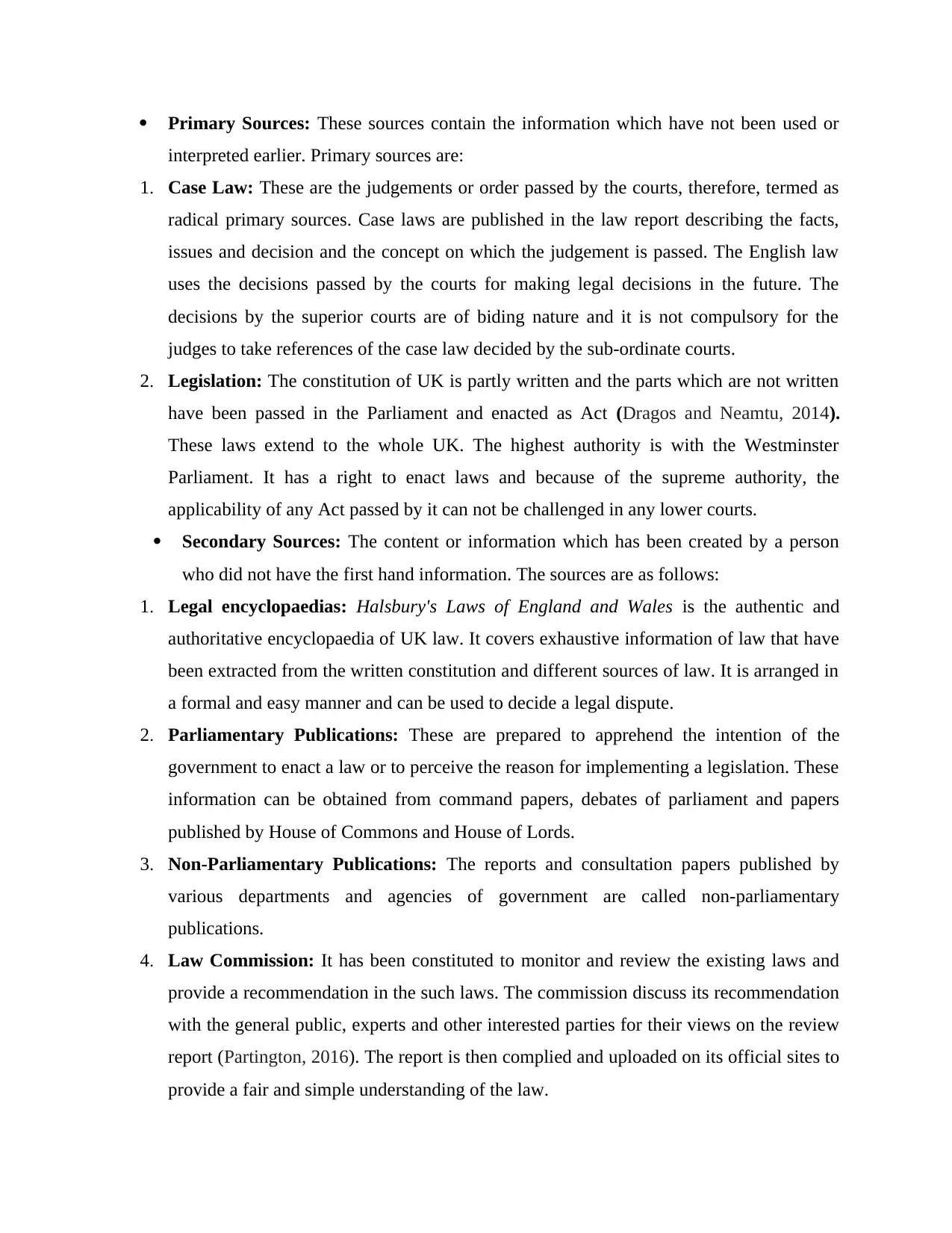
Primary Sources: These sources contain the information which have not been used or
interpreted earlier. Primary sources are:
1. Case Law: These are the judgements or order passed by the courts, therefore, termed as
radical primary sources. Case laws are published in the law report describing the facts,
issues and decision and the concept on which the judgement is passed. The English law
uses the decisions passed by the courts for making legal decisions in the future. The
decisions by the superior courts are of biding nature and it is not compulsory for the
judges to take references of the case law decided by the sub-ordinate courts.
2. Legislation: The constitution of UK is partly written and the parts which are not written
have been passed in the Parliament and enacted as Act (Dragos and Neamtu, 2014).
These laws extend to the whole UK. The highest authority is with the Westminster
Parliament. It has a right to enact laws and because of the supreme authority, the
applicability of any Act passed by it can not be challenged in any lower courts.
Secondary Sources: The content or information which has been created by a person
who did not have the first hand information. The sources are as follows:
1. Legal encyclopaedias: Halsbury's Laws of England and Wales is the authentic and
authoritative encyclopaedia of UK law. It covers exhaustive information of law that have
been extracted from the written constitution and different sources of law. It is arranged in
a formal and easy manner and can be used to decide a legal dispute.
2. Parliamentary Publications: These are prepared to apprehend the intention of the
government to enact a law or to perceive the reason for implementing a legislation. These
information can be obtained from command papers, debates of parliament and papers
published by House of Commons and House of Lords.
3. Non-Parliamentary Publications: The reports and consultation papers published by
various departments and agencies of government are called non-parliamentary
publications.
4. Law Commission: It has been constituted to monitor and review the existing laws and
provide a recommendation in the such laws. The commission discuss its recommendation
with the general public, experts and other interested parties for their views on the review
report (Partington, 2016). The report is then complied and uploaded on its official sites to
provide a fair and simple understanding of the law.
interpreted earlier. Primary sources are:
1. Case Law: These are the judgements or order passed by the courts, therefore, termed as
radical primary sources. Case laws are published in the law report describing the facts,
issues and decision and the concept on which the judgement is passed. The English law
uses the decisions passed by the courts for making legal decisions in the future. The
decisions by the superior courts are of biding nature and it is not compulsory for the
judges to take references of the case law decided by the sub-ordinate courts.
2. Legislation: The constitution of UK is partly written and the parts which are not written
have been passed in the Parliament and enacted as Act (Dragos and Neamtu, 2014).
These laws extend to the whole UK. The highest authority is with the Westminster
Parliament. It has a right to enact laws and because of the supreme authority, the
applicability of any Act passed by it can not be challenged in any lower courts.
Secondary Sources: The content or information which has been created by a person
who did not have the first hand information. The sources are as follows:
1. Legal encyclopaedias: Halsbury's Laws of England and Wales is the authentic and
authoritative encyclopaedia of UK law. It covers exhaustive information of law that have
been extracted from the written constitution and different sources of law. It is arranged in
a formal and easy manner and can be used to decide a legal dispute.
2. Parliamentary Publications: These are prepared to apprehend the intention of the
government to enact a law or to perceive the reason for implementing a legislation. These
information can be obtained from command papers, debates of parliament and papers
published by House of Commons and House of Lords.
3. Non-Parliamentary Publications: The reports and consultation papers published by
various departments and agencies of government are called non-parliamentary
publications.
4. Law Commission: It has been constituted to monitor and review the existing laws and
provide a recommendation in the such laws. The commission discuss its recommendation
with the general public, experts and other interested parties for their views on the review
report (Partington, 2016). The report is then complied and uploaded on its official sites to
provide a fair and simple understanding of the law.
Paraphrase This Document
Need a fresh take? Get an instant paraphrase of this document with our AI Paraphraser
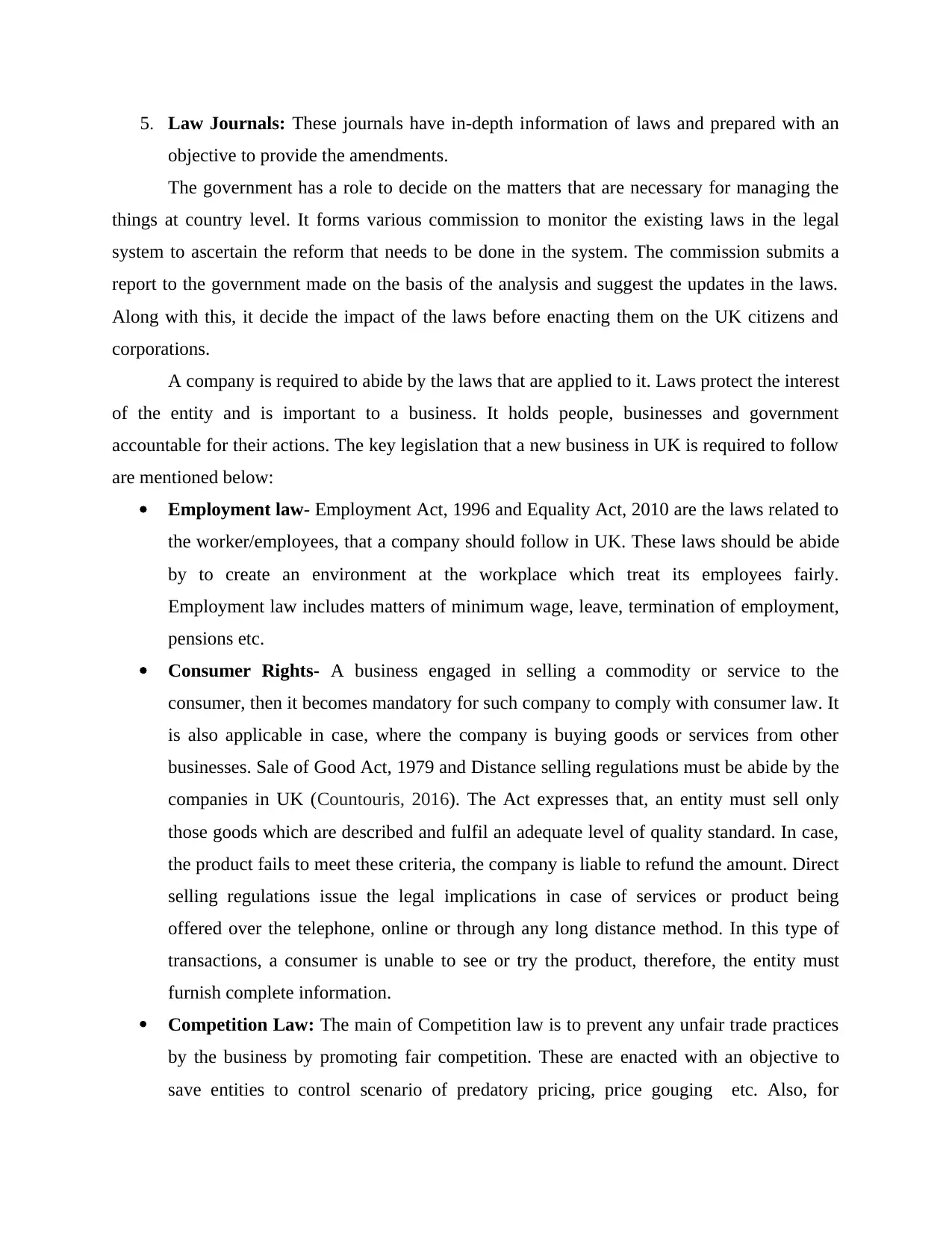
5. Law Journals: These journals have in-depth information of laws and prepared with an
objective to provide the amendments.
The government has a role to decide on the matters that are necessary for managing the
things at country level. It forms various commission to monitor the existing laws in the legal
system to ascertain the reform that needs to be done in the system. The commission submits a
report to the government made on the basis of the analysis and suggest the updates in the laws.
Along with this, it decide the impact of the laws before enacting them on the UK citizens and
corporations.
A company is required to abide by the laws that are applied to it. Laws protect the interest
of the entity and is important to a business. It holds people, businesses and government
accountable for their actions. The key legislation that a new business in UK is required to follow
are mentioned below:
Employment law- Employment Act, 1996 and Equality Act, 2010 are the laws related to
the worker/employees, that a company should follow in UK. These laws should be abide
by to create an environment at the workplace which treat its employees fairly.
Employment law includes matters of minimum wage, leave, termination of employment,
pensions etc.
Consumer Rights- A business engaged in selling a commodity or service to the
consumer, then it becomes mandatory for such company to comply with consumer law. It
is also applicable in case, where the company is buying goods or services from other
businesses. Sale of Good Act, 1979 and Distance selling regulations must be abide by the
companies in UK (Countouris, 2016). The Act expresses that, an entity must sell only
those goods which are described and fulfil an adequate level of quality standard. In case,
the product fails to meet these criteria, the company is liable to refund the amount. Direct
selling regulations issue the legal implications in case of services or product being
offered over the telephone, online or through any long distance method. In this type of
transactions, a consumer is unable to see or try the product, therefore, the entity must
furnish complete information.
Competition Law: The main of Competition law is to prevent any unfair trade practices
by the business by promoting fair competition. These are enacted with an objective to
save entities to control scenario of predatory pricing, price gouging etc. Also, for
objective to provide the amendments.
The government has a role to decide on the matters that are necessary for managing the
things at country level. It forms various commission to monitor the existing laws in the legal
system to ascertain the reform that needs to be done in the system. The commission submits a
report to the government made on the basis of the analysis and suggest the updates in the laws.
Along with this, it decide the impact of the laws before enacting them on the UK citizens and
corporations.
A company is required to abide by the laws that are applied to it. Laws protect the interest
of the entity and is important to a business. It holds people, businesses and government
accountable for their actions. The key legislation that a new business in UK is required to follow
are mentioned below:
Employment law- Employment Act, 1996 and Equality Act, 2010 are the laws related to
the worker/employees, that a company should follow in UK. These laws should be abide
by to create an environment at the workplace which treat its employees fairly.
Employment law includes matters of minimum wage, leave, termination of employment,
pensions etc.
Consumer Rights- A business engaged in selling a commodity or service to the
consumer, then it becomes mandatory for such company to comply with consumer law. It
is also applicable in case, where the company is buying goods or services from other
businesses. Sale of Good Act, 1979 and Distance selling regulations must be abide by the
companies in UK (Countouris, 2016). The Act expresses that, an entity must sell only
those goods which are described and fulfil an adequate level of quality standard. In case,
the product fails to meet these criteria, the company is liable to refund the amount. Direct
selling regulations issue the legal implications in case of services or product being
offered over the telephone, online or through any long distance method. In this type of
transactions, a consumer is unable to see or try the product, therefore, the entity must
furnish complete information.
Competition Law: The main of Competition law is to prevent any unfair trade practices
by the business by promoting fair competition. These are enacted with an objective to
save entities to control scenario of predatory pricing, price gouging etc. Also, for
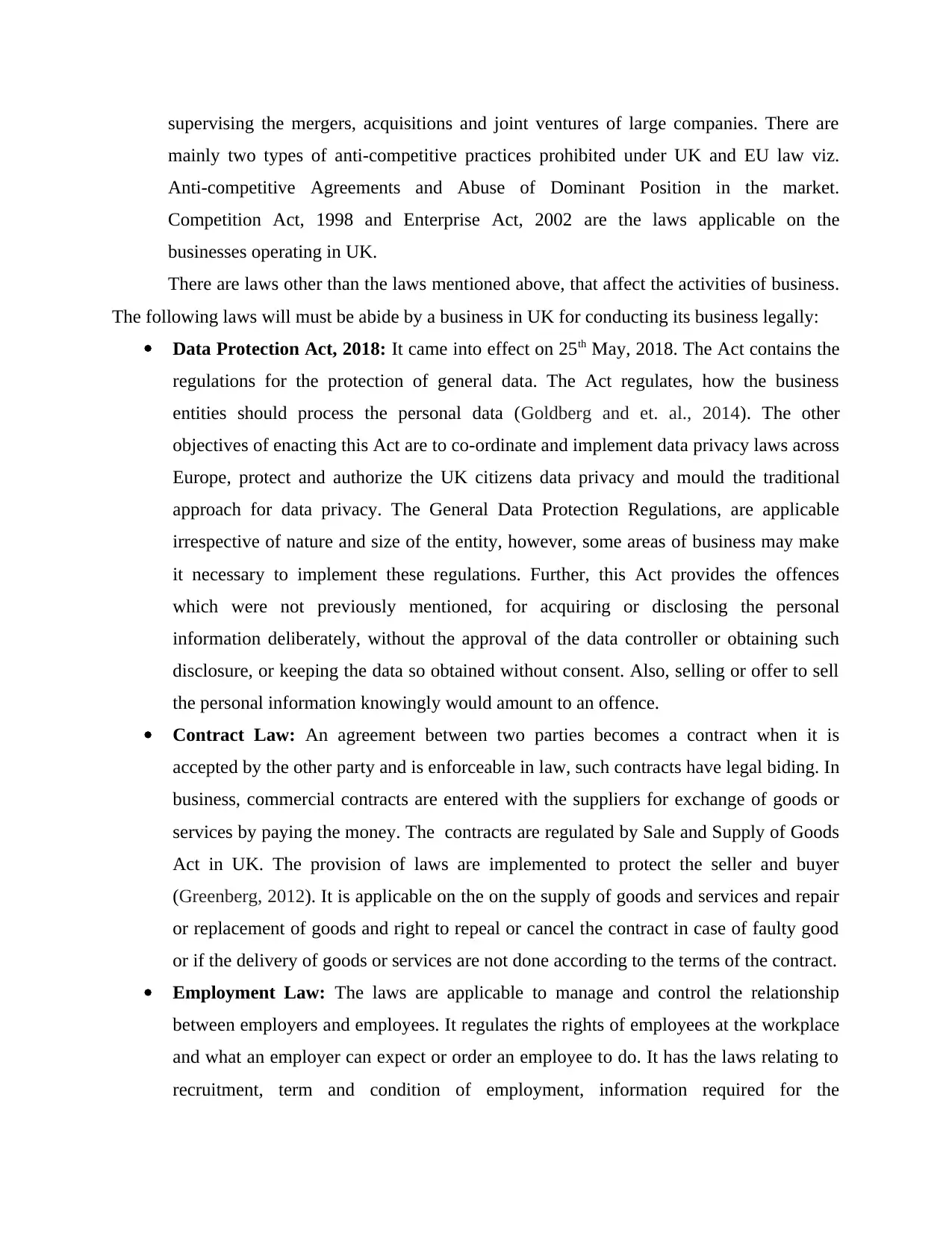
supervising the mergers, acquisitions and joint ventures of large companies. There are
mainly two types of anti-competitive practices prohibited under UK and EU law viz.
Anti-competitive Agreements and Abuse of Dominant Position in the market.
Competition Act, 1998 and Enterprise Act, 2002 are the laws applicable on the
businesses operating in UK.
There are laws other than the laws mentioned above, that affect the activities of business.
The following laws will must be abide by a business in UK for conducting its business legally:
Data Protection Act, 2018: It came into effect on 25th May, 2018. The Act contains the
regulations for the protection of general data. The Act regulates, how the business
entities should process the personal data (Goldberg and et. al., 2014). The other
objectives of enacting this Act are to co-ordinate and implement data privacy laws across
Europe, protect and authorize the UK citizens data privacy and mould the traditional
approach for data privacy. The General Data Protection Regulations, are applicable
irrespective of nature and size of the entity, however, some areas of business may make
it necessary to implement these regulations. Further, this Act provides the offences
which were not previously mentioned, for acquiring or disclosing the personal
information deliberately, without the approval of the data controller or obtaining such
disclosure, or keeping the data so obtained without consent. Also, selling or offer to sell
the personal information knowingly would amount to an offence.
Contract Law: An agreement between two parties becomes a contract when it is
accepted by the other party and is enforceable in law, such contracts have legal biding. In
business, commercial contracts are entered with the suppliers for exchange of goods or
services by paying the money. The contracts are regulated by Sale and Supply of Goods
Act in UK. The provision of laws are implemented to protect the seller and buyer
(Greenberg, 2012). It is applicable on the on the supply of goods and services and repair
or replacement of goods and right to repeal or cancel the contract in case of faulty good
or if the delivery of goods or services are not done according to the terms of the contract.
Employment Law: The laws are applicable to manage and control the relationship
between employers and employees. It regulates the rights of employees at the workplace
and what an employer can expect or order an employee to do. It has the laws relating to
recruitment, term and condition of employment, information required for the
mainly two types of anti-competitive practices prohibited under UK and EU law viz.
Anti-competitive Agreements and Abuse of Dominant Position in the market.
Competition Act, 1998 and Enterprise Act, 2002 are the laws applicable on the
businesses operating in UK.
There are laws other than the laws mentioned above, that affect the activities of business.
The following laws will must be abide by a business in UK for conducting its business legally:
Data Protection Act, 2018: It came into effect on 25th May, 2018. The Act contains the
regulations for the protection of general data. The Act regulates, how the business
entities should process the personal data (Goldberg and et. al., 2014). The other
objectives of enacting this Act are to co-ordinate and implement data privacy laws across
Europe, protect and authorize the UK citizens data privacy and mould the traditional
approach for data privacy. The General Data Protection Regulations, are applicable
irrespective of nature and size of the entity, however, some areas of business may make
it necessary to implement these regulations. Further, this Act provides the offences
which were not previously mentioned, for acquiring or disclosing the personal
information deliberately, without the approval of the data controller or obtaining such
disclosure, or keeping the data so obtained without consent. Also, selling or offer to sell
the personal information knowingly would amount to an offence.
Contract Law: An agreement between two parties becomes a contract when it is
accepted by the other party and is enforceable in law, such contracts have legal biding. In
business, commercial contracts are entered with the suppliers for exchange of goods or
services by paying the money. The contracts are regulated by Sale and Supply of Goods
Act in UK. The provision of laws are implemented to protect the seller and buyer
(Greenberg, 2012). It is applicable on the on the supply of goods and services and repair
or replacement of goods and right to repeal or cancel the contract in case of faulty good
or if the delivery of goods or services are not done according to the terms of the contract.
Employment Law: The laws are applicable to manage and control the relationship
between employers and employees. It regulates the rights of employees at the workplace
and what an employer can expect or order an employee to do. It has the laws relating to
recruitment, term and condition of employment, information required for the
⊘ This is a preview!⊘
Do you want full access?
Subscribe today to unlock all pages.

Trusted by 1+ million students worldwide
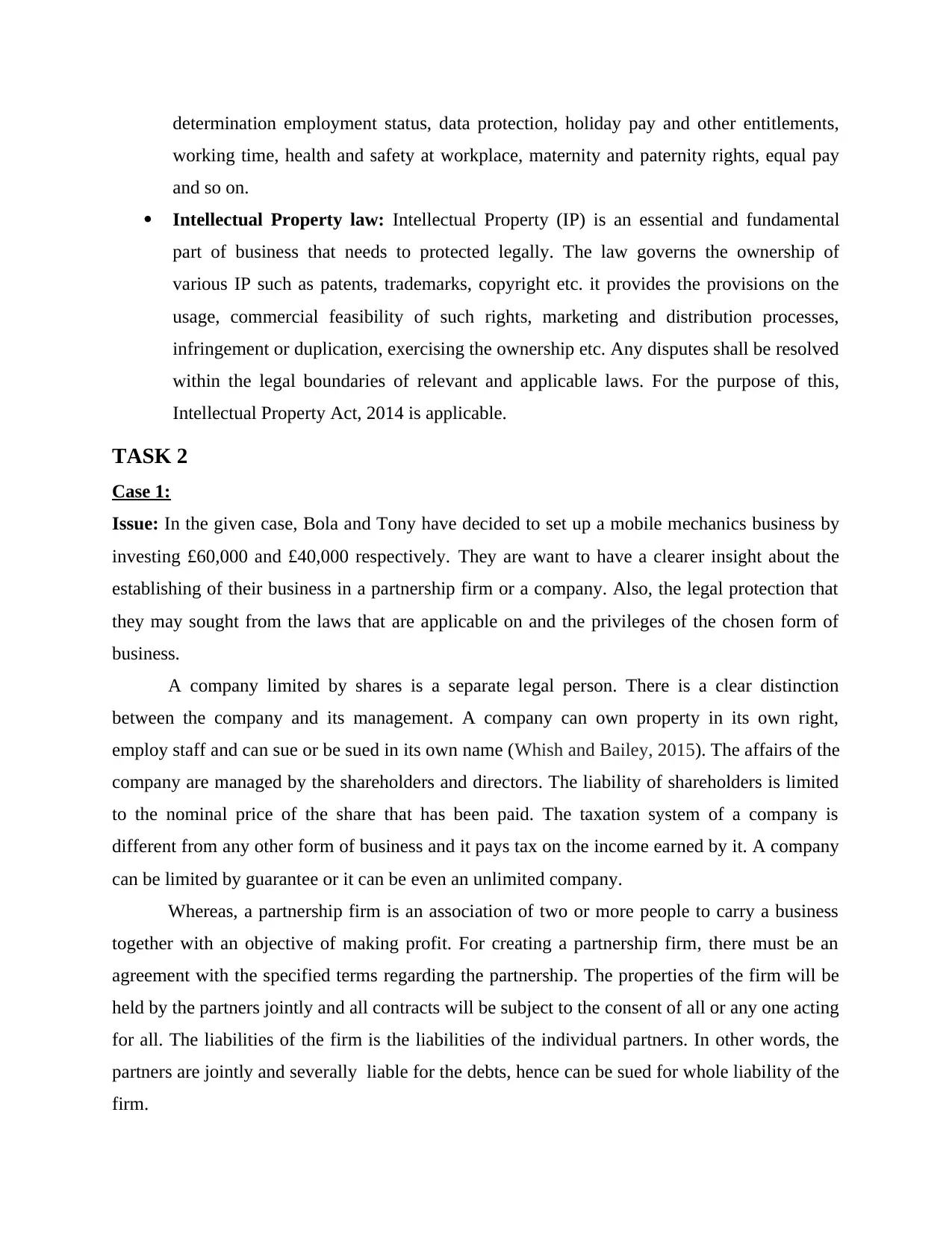
determination employment status, data protection, holiday pay and other entitlements,
working time, health and safety at workplace, maternity and paternity rights, equal pay
and so on.
Intellectual Property law: Intellectual Property (IP) is an essential and fundamental
part of business that needs to protected legally. The law governs the ownership of
various IP such as patents, trademarks, copyright etc. it provides the provisions on the
usage, commercial feasibility of such rights, marketing and distribution processes,
infringement or duplication, exercising the ownership etc. Any disputes shall be resolved
within the legal boundaries of relevant and applicable laws. For the purpose of this,
Intellectual Property Act, 2014 is applicable.
TASK 2
Case 1:
Issue: In the given case, Bola and Tony have decided to set up a mobile mechanics business by
investing £60,000 and £40,000 respectively. They are want to have a clearer insight about the
establishing of their business in a partnership firm or a company. Also, the legal protection that
they may sought from the laws that are applicable on and the privileges of the chosen form of
business.
A company limited by shares is a separate legal person. There is a clear distinction
between the company and its management. A company can own property in its own right,
employ staff and can sue or be sued in its own name (Whish and Bailey, 2015). The affairs of the
company are managed by the shareholders and directors. The liability of shareholders is limited
to the nominal price of the share that has been paid. The taxation system of a company is
different from any other form of business and it pays tax on the income earned by it. A company
can be limited by guarantee or it can be even an unlimited company.
Whereas, a partnership firm is an association of two or more people to carry a business
together with an objective of making profit. For creating a partnership firm, there must be an
agreement with the specified terms regarding the partnership. The properties of the firm will be
held by the partners jointly and all contracts will be subject to the consent of all or any one acting
for all. The liabilities of the firm is the liabilities of the individual partners. In other words, the
partners are jointly and severally liable for the debts, hence can be sued for whole liability of the
firm.
working time, health and safety at workplace, maternity and paternity rights, equal pay
and so on.
Intellectual Property law: Intellectual Property (IP) is an essential and fundamental
part of business that needs to protected legally. The law governs the ownership of
various IP such as patents, trademarks, copyright etc. it provides the provisions on the
usage, commercial feasibility of such rights, marketing and distribution processes,
infringement or duplication, exercising the ownership etc. Any disputes shall be resolved
within the legal boundaries of relevant and applicable laws. For the purpose of this,
Intellectual Property Act, 2014 is applicable.
TASK 2
Case 1:
Issue: In the given case, Bola and Tony have decided to set up a mobile mechanics business by
investing £60,000 and £40,000 respectively. They are want to have a clearer insight about the
establishing of their business in a partnership firm or a company. Also, the legal protection that
they may sought from the laws that are applicable on and the privileges of the chosen form of
business.
A company limited by shares is a separate legal person. There is a clear distinction
between the company and its management. A company can own property in its own right,
employ staff and can sue or be sued in its own name (Whish and Bailey, 2015). The affairs of the
company are managed by the shareholders and directors. The liability of shareholders is limited
to the nominal price of the share that has been paid. The taxation system of a company is
different from any other form of business and it pays tax on the income earned by it. A company
can be limited by guarantee or it can be even an unlimited company.
Whereas, a partnership firm is an association of two or more people to carry a business
together with an objective of making profit. For creating a partnership firm, there must be an
agreement with the specified terms regarding the partnership. The properties of the firm will be
held by the partners jointly and all contracts will be subject to the consent of all or any one acting
for all. The liabilities of the firm is the liabilities of the individual partners. In other words, the
partners are jointly and severally liable for the debts, hence can be sued for whole liability of the
firm.
Paraphrase This Document
Need a fresh take? Get an instant paraphrase of this document with our AI Paraphraser
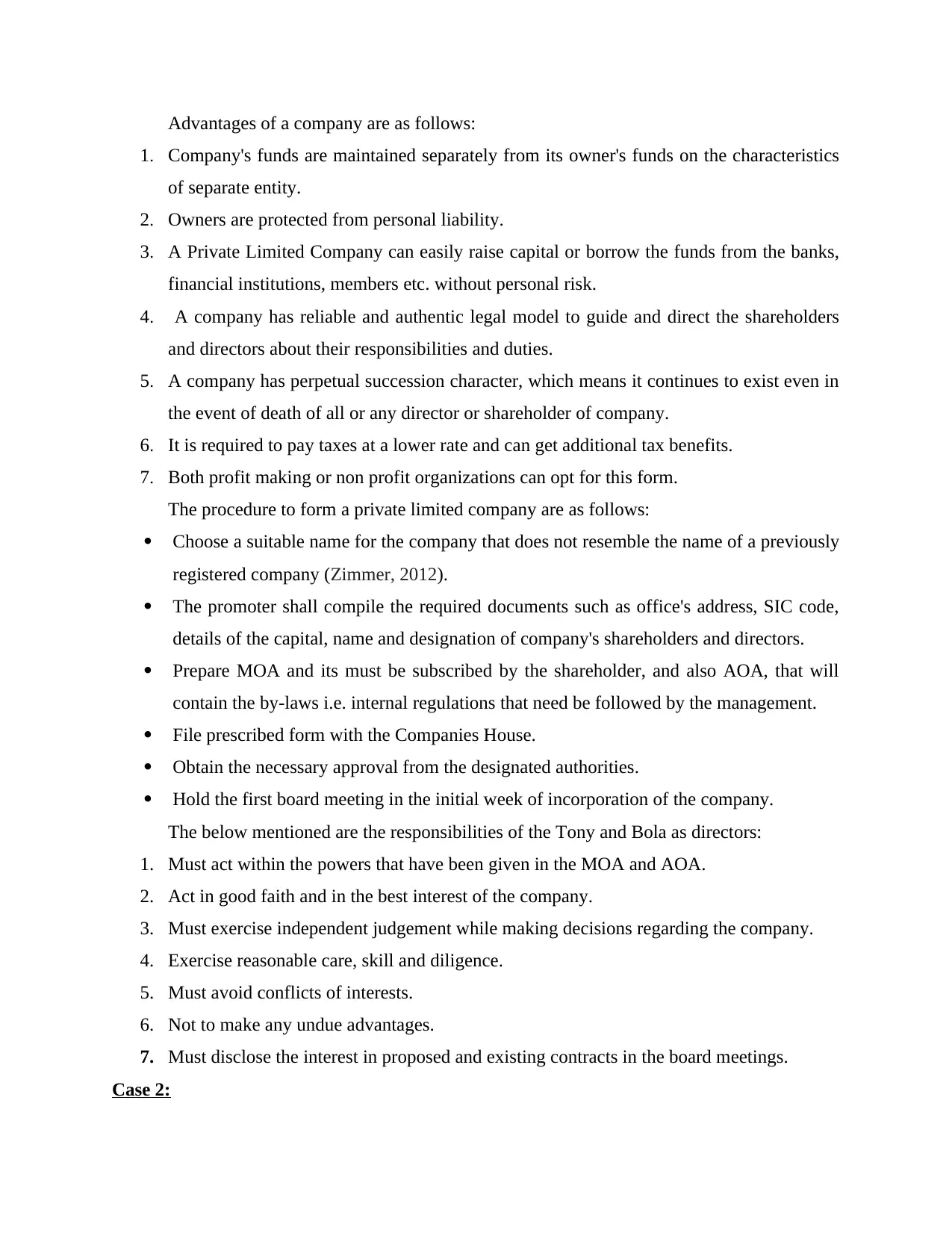
Advantages of a company are as follows:
1. Company's funds are maintained separately from its owner's funds on the characteristics
of separate entity.
2. Owners are protected from personal liability.
3. A Private Limited Company can easily raise capital or borrow the funds from the banks,
financial institutions, members etc. without personal risk.
4. A company has reliable and authentic legal model to guide and direct the shareholders
and directors about their responsibilities and duties.
5. A company has perpetual succession character, which means it continues to exist even in
the event of death of all or any director or shareholder of company.
6. It is required to pay taxes at a lower rate and can get additional tax benefits.
7. Both profit making or non profit organizations can opt for this form.
The procedure to form a private limited company are as follows:
Choose a suitable name for the company that does not resemble the name of a previously
registered company (Zimmer, 2012).
The promoter shall compile the required documents such as office's address, SIC code,
details of the capital, name and designation of company's shareholders and directors.
Prepare MOA and its must be subscribed by the shareholder, and also AOA, that will
contain the by-laws i.e. internal regulations that need be followed by the management.
File prescribed form with the Companies House.
Obtain the necessary approval from the designated authorities.
Hold the first board meeting in the initial week of incorporation of the company.
The below mentioned are the responsibilities of the Tony and Bola as directors:
1. Must act within the powers that have been given in the MOA and AOA.
2. Act in good faith and in the best interest of the company.
3. Must exercise independent judgement while making decisions regarding the company.
4. Exercise reasonable care, skill and diligence.
5. Must avoid conflicts of interests.
6. Not to make any undue advantages.
7. Must disclose the interest in proposed and existing contracts in the board meetings.
Case 2:
1. Company's funds are maintained separately from its owner's funds on the characteristics
of separate entity.
2. Owners are protected from personal liability.
3. A Private Limited Company can easily raise capital or borrow the funds from the banks,
financial institutions, members etc. without personal risk.
4. A company has reliable and authentic legal model to guide and direct the shareholders
and directors about their responsibilities and duties.
5. A company has perpetual succession character, which means it continues to exist even in
the event of death of all or any director or shareholder of company.
6. It is required to pay taxes at a lower rate and can get additional tax benefits.
7. Both profit making or non profit organizations can opt for this form.
The procedure to form a private limited company are as follows:
Choose a suitable name for the company that does not resemble the name of a previously
registered company (Zimmer, 2012).
The promoter shall compile the required documents such as office's address, SIC code,
details of the capital, name and designation of company's shareholders and directors.
Prepare MOA and its must be subscribed by the shareholder, and also AOA, that will
contain the by-laws i.e. internal regulations that need be followed by the management.
File prescribed form with the Companies House.
Obtain the necessary approval from the designated authorities.
Hold the first board meeting in the initial week of incorporation of the company.
The below mentioned are the responsibilities of the Tony and Bola as directors:
1. Must act within the powers that have been given in the MOA and AOA.
2. Act in good faith and in the best interest of the company.
3. Must exercise independent judgement while making decisions regarding the company.
4. Exercise reasonable care, skill and diligence.
5. Must avoid conflicts of interests.
6. Not to make any undue advantages.
7. Must disclose the interest in proposed and existing contracts in the board meetings.
Case 2:
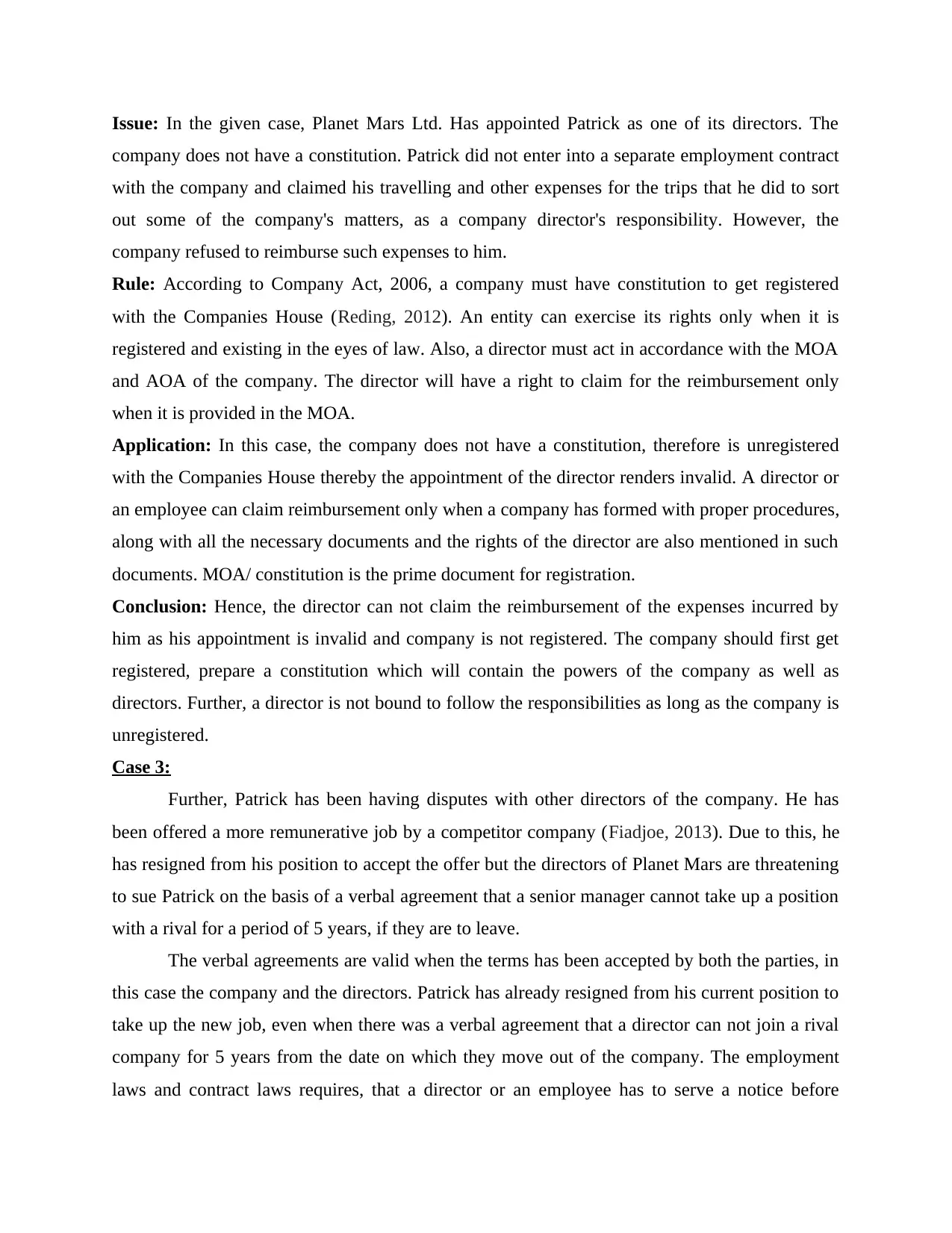
Issue: In the given case, Planet Mars Ltd. Has appointed Patrick as one of its directors. The
company does not have a constitution. Patrick did not enter into a separate employment contract
with the company and claimed his travelling and other expenses for the trips that he did to sort
out some of the company's matters, as a company director's responsibility. However, the
company refused to reimburse such expenses to him.
Rule: According to Company Act, 2006, a company must have constitution to get registered
with the Companies House (Reding, 2012). An entity can exercise its rights only when it is
registered and existing in the eyes of law. Also, a director must act in accordance with the MOA
and AOA of the company. The director will have a right to claim for the reimbursement only
when it is provided in the MOA.
Application: In this case, the company does not have a constitution, therefore is unregistered
with the Companies House thereby the appointment of the director renders invalid. A director or
an employee can claim reimbursement only when a company has formed with proper procedures,
along with all the necessary documents and the rights of the director are also mentioned in such
documents. MOA/ constitution is the prime document for registration.
Conclusion: Hence, the director can not claim the reimbursement of the expenses incurred by
him as his appointment is invalid and company is not registered. The company should first get
registered, prepare a constitution which will contain the powers of the company as well as
directors. Further, a director is not bound to follow the responsibilities as long as the company is
unregistered.
Case 3:
Further, Patrick has been having disputes with other directors of the company. He has
been offered a more remunerative job by a competitor company (Fiadjoe, 2013). Due to this, he
has resigned from his position to accept the offer but the directors of Planet Mars are threatening
to sue Patrick on the basis of a verbal agreement that a senior manager cannot take up a position
with a rival for a period of 5 years, if they are to leave.
The verbal agreements are valid when the terms has been accepted by both the parties, in
this case the company and the directors. Patrick has already resigned from his current position to
take up the new job, even when there was a verbal agreement that a director can not join a rival
company for 5 years from the date on which they move out of the company. The employment
laws and contract laws requires, that a director or an employee has to serve a notice before
company does not have a constitution. Patrick did not enter into a separate employment contract
with the company and claimed his travelling and other expenses for the trips that he did to sort
out some of the company's matters, as a company director's responsibility. However, the
company refused to reimburse such expenses to him.
Rule: According to Company Act, 2006, a company must have constitution to get registered
with the Companies House (Reding, 2012). An entity can exercise its rights only when it is
registered and existing in the eyes of law. Also, a director must act in accordance with the MOA
and AOA of the company. The director will have a right to claim for the reimbursement only
when it is provided in the MOA.
Application: In this case, the company does not have a constitution, therefore is unregistered
with the Companies House thereby the appointment of the director renders invalid. A director or
an employee can claim reimbursement only when a company has formed with proper procedures,
along with all the necessary documents and the rights of the director are also mentioned in such
documents. MOA/ constitution is the prime document for registration.
Conclusion: Hence, the director can not claim the reimbursement of the expenses incurred by
him as his appointment is invalid and company is not registered. The company should first get
registered, prepare a constitution which will contain the powers of the company as well as
directors. Further, a director is not bound to follow the responsibilities as long as the company is
unregistered.
Case 3:
Further, Patrick has been having disputes with other directors of the company. He has
been offered a more remunerative job by a competitor company (Fiadjoe, 2013). Due to this, he
has resigned from his position to accept the offer but the directors of Planet Mars are threatening
to sue Patrick on the basis of a verbal agreement that a senior manager cannot take up a position
with a rival for a period of 5 years, if they are to leave.
The verbal agreements are valid when the terms has been accepted by both the parties, in
this case the company and the directors. Patrick has already resigned from his current position to
take up the new job, even when there was a verbal agreement that a director can not join a rival
company for 5 years from the date on which they move out of the company. The employment
laws and contract laws requires, that a director or an employee has to serve a notice before
⊘ This is a preview!⊘
Do you want full access?
Subscribe today to unlock all pages.

Trusted by 1+ million students worldwide
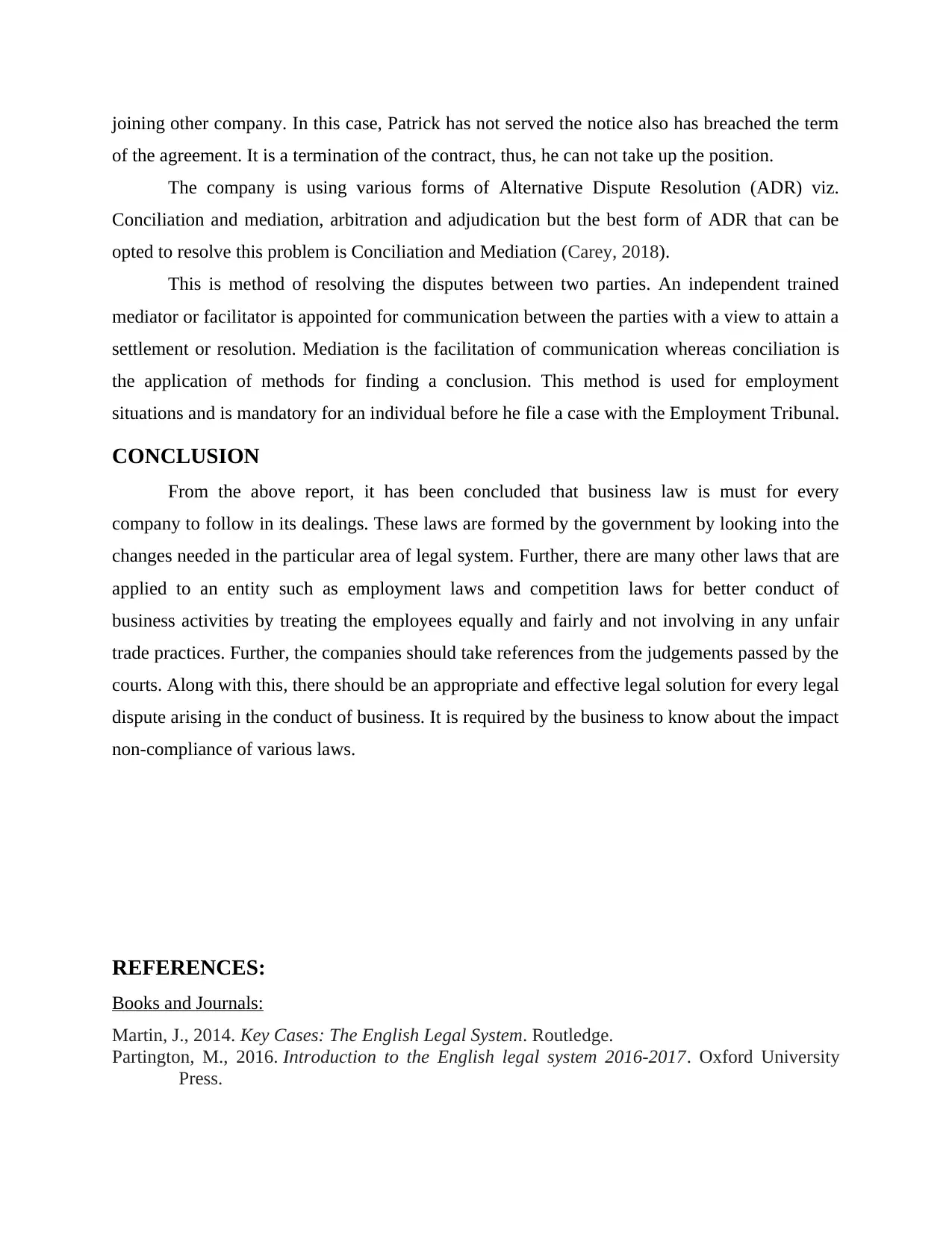
joining other company. In this case, Patrick has not served the notice also has breached the term
of the agreement. It is a termination of the contract, thus, he can not take up the position.
The company is using various forms of Alternative Dispute Resolution (ADR) viz.
Conciliation and mediation, arbitration and adjudication but the best form of ADR that can be
opted to resolve this problem is Conciliation and Mediation (Carey, 2018).
This is method of resolving the disputes between two parties. An independent trained
mediator or facilitator is appointed for communication between the parties with a view to attain a
settlement or resolution. Mediation is the facilitation of communication whereas conciliation is
the application of methods for finding a conclusion. This method is used for employment
situations and is mandatory for an individual before he file a case with the Employment Tribunal.
CONCLUSION
From the above report, it has been concluded that business law is must for every
company to follow in its dealings. These laws are formed by the government by looking into the
changes needed in the particular area of legal system. Further, there are many other laws that are
applied to an entity such as employment laws and competition laws for better conduct of
business activities by treating the employees equally and fairly and not involving in any unfair
trade practices. Further, the companies should take references from the judgements passed by the
courts. Along with this, there should be an appropriate and effective legal solution for every legal
dispute arising in the conduct of business. It is required by the business to know about the impact
non-compliance of various laws.
REFERENCES:
Books and Journals:
Martin, J., 2014. Key Cases: The English Legal System. Routledge.
Partington, M., 2016. Introduction to the English legal system 2016-2017. Oxford University
Press.
of the agreement. It is a termination of the contract, thus, he can not take up the position.
The company is using various forms of Alternative Dispute Resolution (ADR) viz.
Conciliation and mediation, arbitration and adjudication but the best form of ADR that can be
opted to resolve this problem is Conciliation and Mediation (Carey, 2018).
This is method of resolving the disputes between two parties. An independent trained
mediator or facilitator is appointed for communication between the parties with a view to attain a
settlement or resolution. Mediation is the facilitation of communication whereas conciliation is
the application of methods for finding a conclusion. This method is used for employment
situations and is mandatory for an individual before he file a case with the Employment Tribunal.
CONCLUSION
From the above report, it has been concluded that business law is must for every
company to follow in its dealings. These laws are formed by the government by looking into the
changes needed in the particular area of legal system. Further, there are many other laws that are
applied to an entity such as employment laws and competition laws for better conduct of
business activities by treating the employees equally and fairly and not involving in any unfair
trade practices. Further, the companies should take references from the judgements passed by the
courts. Along with this, there should be an appropriate and effective legal solution for every legal
dispute arising in the conduct of business. It is required by the business to know about the impact
non-compliance of various laws.
REFERENCES:
Books and Journals:
Martin, J., 2014. Key Cases: The English Legal System. Routledge.
Partington, M., 2016. Introduction to the English legal system 2016-2017. Oxford University
Press.
Paraphrase This Document
Need a fresh take? Get an instant paraphrase of this document with our AI Paraphraser
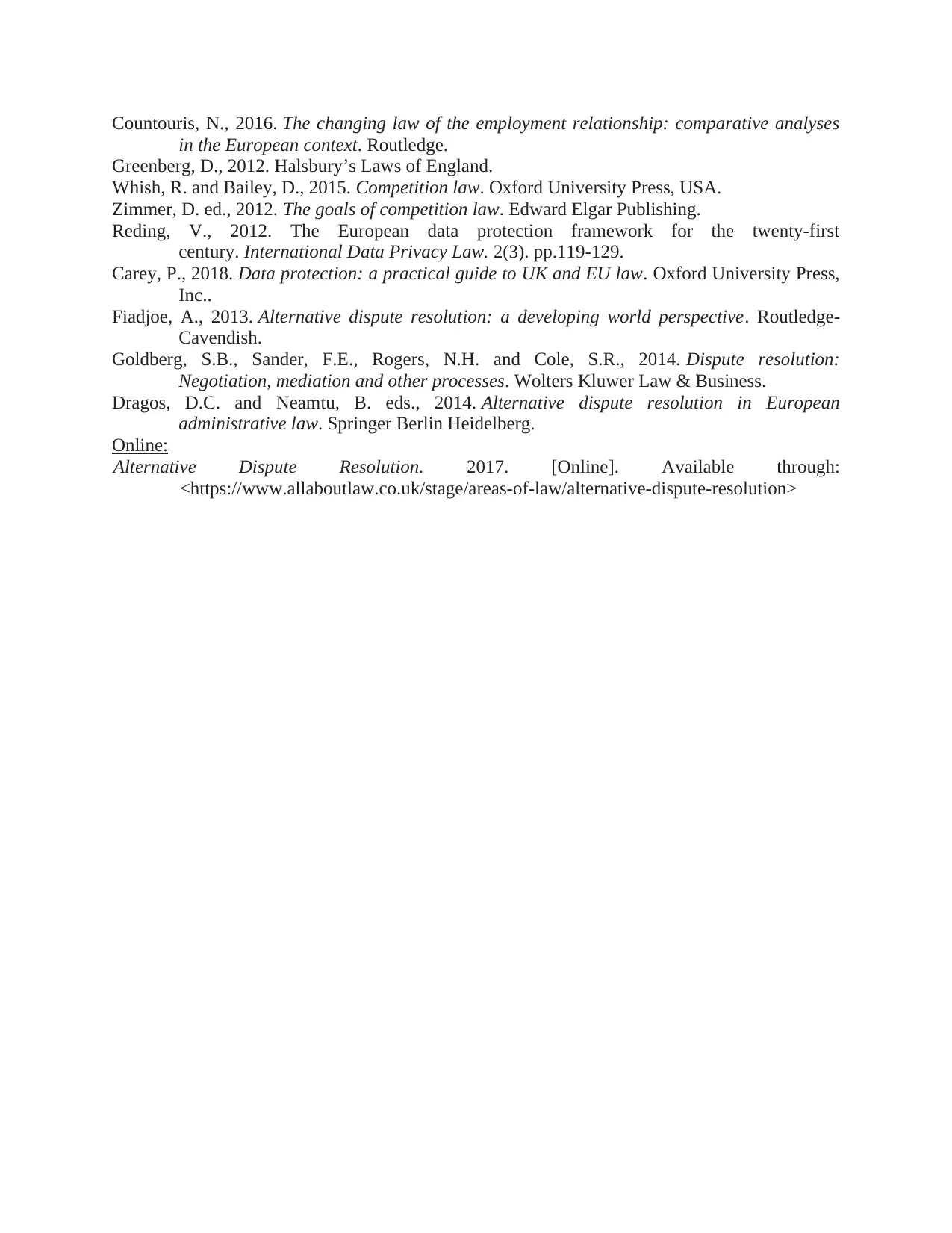
Countouris, N., 2016. The changing law of the employment relationship: comparative analyses
in the European context. Routledge.
Greenberg, D., 2012. Halsbury’s Laws of England.
Whish, R. and Bailey, D., 2015. Competition law. Oxford University Press, USA.
Zimmer, D. ed., 2012. The goals of competition law. Edward Elgar Publishing.
Reding, V., 2012. The European data protection framework for the twenty-first
century. International Data Privacy Law. 2(3). pp.119-129.
Carey, P., 2018. Data protection: a practical guide to UK and EU law. Oxford University Press,
Inc..
Fiadjoe, A., 2013. Alternative dispute resolution: a developing world perspective. Routledge-
Cavendish.
Goldberg, S.B., Sander, F.E., Rogers, N.H. and Cole, S.R., 2014. Dispute resolution:
Negotiation, mediation and other processes. Wolters Kluwer Law & Business.
Dragos, D.C. and Neamtu, B. eds., 2014. Alternative dispute resolution in European
administrative law. Springer Berlin Heidelberg.
Online:
Alternative Dispute Resolution. 2017. [Online]. Available through:
<https://www.allaboutlaw.co.uk/stage/areas-of-law/alternative-dispute-resolution>
in the European context. Routledge.
Greenberg, D., 2012. Halsbury’s Laws of England.
Whish, R. and Bailey, D., 2015. Competition law. Oxford University Press, USA.
Zimmer, D. ed., 2012. The goals of competition law. Edward Elgar Publishing.
Reding, V., 2012. The European data protection framework for the twenty-first
century. International Data Privacy Law. 2(3). pp.119-129.
Carey, P., 2018. Data protection: a practical guide to UK and EU law. Oxford University Press,
Inc..
Fiadjoe, A., 2013. Alternative dispute resolution: a developing world perspective. Routledge-
Cavendish.
Goldberg, S.B., Sander, F.E., Rogers, N.H. and Cole, S.R., 2014. Dispute resolution:
Negotiation, mediation and other processes. Wolters Kluwer Law & Business.
Dragos, D.C. and Neamtu, B. eds., 2014. Alternative dispute resolution in European
administrative law. Springer Berlin Heidelberg.
Online:
Alternative Dispute Resolution. 2017. [Online]. Available through:
<https://www.allaboutlaw.co.uk/stage/areas-of-law/alternative-dispute-resolution>
1 out of 11
Related Documents
Your All-in-One AI-Powered Toolkit for Academic Success.
+13062052269
info@desklib.com
Available 24*7 on WhatsApp / Email
![[object Object]](/_next/static/media/star-bottom.7253800d.svg)
Unlock your academic potential
Copyright © 2020–2026 A2Z Services. All Rights Reserved. Developed and managed by ZUCOL.





